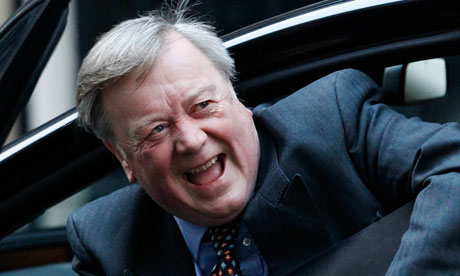Guardian Explains US Secret Courts Asks "What do they mean for United Kingdom Justice ?"
What are secret courts and what do they mean for UK justice?
The Justice and Security Act has extended closed material procedures into the main civil courts

Ken Clarke, who says the government has in the past paid compensation because it could not disclose evidence in court. Photograph: Luke Macgregor/Reuters
The Justice and Security Act was given parliamentary approval on 25 April this year. One of the main justifications for expanding so-called secret courts was to prevent intelligence provided by US sources being exposed in British courts.
The Guardian's revelation that GCHQ, the UK's electronic eavesdropping and security agency, received material obtained by America's National Security Agency (NSA) through Prism, the online surveillance operation, will reinforce fears about what is being withheld from open court hearings.
What is a secret court?
The legal mechanism is known as closed material procedures (CMP). Secret intelligence can be introduced by the government but will only be seen by the judge and security-cleared "special advocates". The special advocate who represents the interest of an individual claimant cannot reveal precise details of the evidence and may only provide a "gist" or loose summary. Claimants may not, therefore, be aware of all the allegations made against them. Critics say this results in parties no longer being on an equal footing, tilting the advantage in the government's favour.
Haven't some hearings always been held behind closed doors?
Closed hearings are not unprecedented. Cases in the family division of the high court relating to child custody and divorce issues are regularly held in camera to protect privacy. CMPs are already used in employment tribunals, special immigration appeals commission hearings and the investigatory powers tribunal, which handles complaints about the intelligence services. The Justice and Security Act has now extended them into the main civil courts, allowing the government to exploit intelligence material to defend itself against claims for damages over alleged mistreatment such as rendition and torture.
Why does the government want more secret courts?
One rationale for the change was to preserve the integrity of the UK's secret intelligence exchanges with the US and other allies. Dismissing legal attempts to disclose such information, Ken Clarke, the cabinet minister without portfolio, said: "No other country in the world allows this kind of legal tourism to happen – for the good reason that it undermines confidence among other countries that might otherwise share vital intelligence with us."
What will be the effect of more secret courts?
Ken Clarke believes that more intelligence-related cases will come to court in future. In the past, he has said, the government was forced to settle and pay out compensation because it could not disclose evidence in court.
The independent reviewer of terrorism legislation, David Anderson QC, has described secret courts as "tolerable" as a last resort. There is "a small but indeterminate category of national-security-related claims, both for judicial review of executive decisions and for civil damages, in respect of which it is preferable that the option of a CMP – for all its inadequacies – should exist", he has said.
A first indication of how senior judges assess the process will come next Wednesday when the supreme court, which has held its first closed session, gives judgment in the case of Bank Mellat. The justices heard secret evidence about the Tehran finance house, which is challenging a Treasury-imposed trading ban, and its alleged involvement in transactions relating to Iran's nuclear programme.
|

